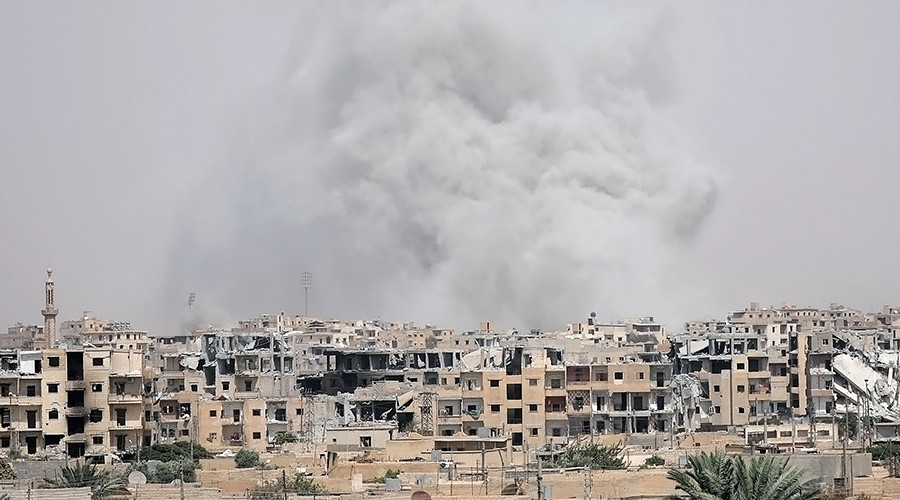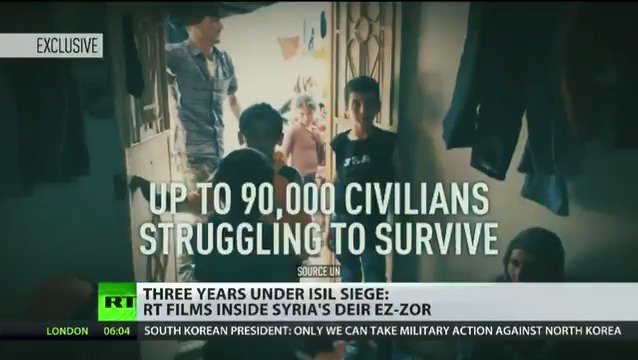US will remain in Syria for decades after ISIS defeated, Kurdish militia allies say

One of Washington’s main allies in their fight against the Islamic State in Syria says US forces will remain in the country’s north long after the jihadists are defeated. Enduring ties with the Kurdish dominated region is said to be a goal of the US.
The Syrian Democratic Forces (SDF), a US-backed alliance of militias dominated by the Kurdish YPG, also known as the People’s Protection Unit, are under the impression that the US has a “strategic interest” in staying in the region, SDF spokesman Talal Silo told Reuters.
“They have a strategy policy for decades to come. There will be military, economic and political agreements in the long term between the leadership of the northern areas (of Syria) and the US administration,”Silo said.
Washington has supported the YPG, a homegrown defense force in the Kurdish area of Syria, with equipment and airstrikes. However, the YPG is closely linked to the Kurdish Workers Party, or PKK, which is deemed a terrorist organization by Turkey, another US ally.
Last month, the head of the YPG said the US had established seven military bases in areas of northern Syria controlled by the SDF or YPG. This includes a major airbase near Kobani, a town that borders Turkey. They have also supported the SDF with artillery, airstrikes and special forces on the ground.
Colonel Ryan Dillon, a spokesman for the coalition, was asked by Reuters about long term strategy, but he directed that question to the Pentagon. He did mention, though, that there is “still a lot of fighting to do, even after ISIS has been defeated in Raqqa.”
Dillon also stated that the Islamic State (IS, formerly ISIS/ISIL) has remained in strongholds along the Euphrates River Valley, a reference to its stronghold in Deir ez-Zor province, southeast of Raqqa.
“Our mission... is to defeat ISIS in designated areas of Iraq and Syria and to set conditions for follow-on operations to increase regional stability,” Dillon said, Reuters reported.
In Washington, Eric Pahon, a Pentagon spokesman said: “The Department of Defense does not discuss timelines for future operations. However we remain committed to the destruction of ISIS and preventing its return.”
The SDF and YPG dominate an uninterrupted 250-mile (400km) stretch of the Syrian-Turkish border. This area gave way to Kurdish-led independent administrations which have taken control since the start of the Syrian conflict in 2011.
Also, a major point of contention between the US and Syria’s bordering country, Turkey, is the US alliance with the YPG and SDF. Turkey sees the YPG as an extension of the PKK which has been waging a three-decade insurgency in Turkey.
Under President Donald Trump, the US started to distribute arms to the YPG in March before the final assault on Raqqa city. This infuriated Turkey, which has thus far unsuccessfully lobbied Washington to cut ties with the SDF.
The SDF spokesman explained what he believes the US presence in this region will ultimately lead to.
“The Americans have strategic interests here after the end of Daesh,” Silo said, using the Arabic pejorative term for IS.
“They (recently) referred to the possibility of securing an area to prepare for a military airport. These are the beginnings – they're not giving support just to leave. America is not providing all this support for free,” Silo said, according to Reuters.
“Maybe there could be an alternative to their base in Turkey,” Silo said, in reference to the Incirlik Air Base.
Author and journalist, Max Blumenthal told RT America that fighting IS is but a pretext for the US to extend its influence in Syria.
“[The] US has clearly benefited from a long standing project of destabilizing Syria,” Blumenthal said. The decision to fight ISIS in this area “was simply a pretext for establishing US influence.”
The coalition said it does not discuss the location of its forces because of operational security.
Even though SDF forces are optimistic about a continued US presence in the region, there is concern that Washington won’t provide enough support to YPG-allied forces and civil councils controlling northeast Syria.
“We're constantly asking them for clear, public political support,” Silo said.
Silo also said that SDF forces held their first public meeting with US State Department officials this month. “At the moment there are no meetings being held for a real discussion of Syria's future. There are initiatives for developing political support for our forces, but we hope this will be bigger.”


0 Comments:
Post a Comment
Subscribe to Post Comments [Atom]
<< Home